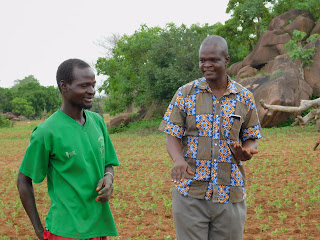FARMERS IN KUNKUA BENEFIT FROM SARI-CSIR INTERVENTION 24th July, 2019
Several hundreds of soya bean farmers in the Kunkua community of
the Bongo District in the Upper East region, are benefiting from an agric-
research intervention programme dubbed “Rhizobium Inoculum Technology Project”.
The project is the brain-child of a research conducted by the Council for
Scientific and Industrial Research [CSIR] and its affiliate, the Savannah
Agriculture Research Institute [SARI] in conjunction with some partners from
the United States’ North Carolina Agriculture and Technical University.
That research was christened; “Using Rhizobium Inoculants and Best Production Practices to Propel the Ghanaian Soybean Value Chain for Accelerated Poverty Reduction”.
In responding to a question from a farmer as to what kind of
seed to sow from now, he replied that as the year’s cropping season stood now,
it was a perfect period for cow pea bad a decision to put others seeds such as
maize and groundnuts in the soil.
That research was christened; “Using Rhizobium Inoculants and Best Production Practices to Propel the Ghanaian Soybean Value Chain for Accelerated Poverty Reduction”.
A SARI Senior Research Scientist, Dr. Issah Sugri on
Wednesday, led a team of their US partners to the project experimental farms at
Kunkua for interactions with beneficiary farmers as well as to have a hands-on
feel as to how the intervention was running in the area. He told the farmers
and the US team that, the inoculant was a biological fertilizer that had the
capacity to increase yields of leguminous crops such as soya beans if farmers
adhered to simple farm techniques his outfit had introduced to them over time.
 |
| Dr. Issah Sugri [SARI] explaining a point to a farmer |
The CSIR and its affiliate, SARI are the lead implementers of
the intervention with funding from the United Sates Department of Agriculture
through the Scientific Support Research Programme. The two research
institutions are also receiving technical support and other forms of expertise
from the North Carolina Agriculture and Technical University among other local
partners for the effective implementation of the project.
According to Dr. Sugri, inoculants which are produced by his
organisation, are easy to apply and were cheaper than traditional chemical
fertilizers. He disclosed that the farm size for the Kunkua experiment was four
plots measuring 20 by 30 metres each and that in 2018, a similar intervention
was made available to farmers in the Feo and Ayelbia communities also in the
Bongo District. He said the farmers were often guided how to cultivate an
inoculated farm side by side an un-inoculated farm so that at harvest, a
comparison is drawn based on the outcome of yields. He emphasised that from
previous trials, the inoculated farms always did better.
He explained that the focus was on soya bean because, it is a
nutritious crop and had several potentials such as being rich in proteins and
excellent for production of food products including weaning foods for babies.
He added that, soya holds huge economic potentials as it could also be sold in
larger quantities to oil manufacturing firms thus bringing bigger profits to the
rural farmer.
According to him, the Kunkua farmers were recently supplied
with a new soya variety known as the CSIR-Favour, a high-yielding soya bean
variety to sow as part of the project. He cautioned farmers against applying
just any fertilizer on their crops stressing that, specific crops had their
corresponding specific fertilizers and that when in doubt, they should always
consult the technocrats such as SARI staff or extension officers from the
district’s Department of Agriculture.
 |
| The framers exhibit their sowing skills |
A partner researcher on the project, Professor Osei Yeboah
who is also the Coordinator – International Agricultural Development &
Engagement Certificate Programme, North Carolina-USA interacted with the
farmers and observed that, if the rural Ghanaian farmer was to rake in any
meaningful income, he/she could not continue doing same things on the farm as
in 30 years ago.
 |
| Prof. Osei Yeboah giving his remarks |
Prof. Yeboah who has been lending expert support to SARI for
about six years now stated that, any crop that grows vertically, gives the
farmer more room to sow more on the same farm land thereby increasing yields.
He thus noted that, soya farmers were in good business only if they follow
exactly the lessons given by the SARI field officers. He espoused his own
formula for making money from the farm as strict rhizobium application, good
soil, use of certified seed and adopting proper planting density.
Associate Dean of Agricultural Research and Environmental
Sciences at the North Carolina A&T State University, Dr. Shirley
Hymon-Parker is one of the authorities that gives approval to proposals written
by Prof. Yeboah for funding to the project. She followed up for the first time
to see the impact of the project and expressed satisfaction with work done so
far. She pledged to act expeditiously on future proposals submitted to her in
order to ensure that more funds were released to help scale up the intervention
in Ghana.


.jpeg)
Comments